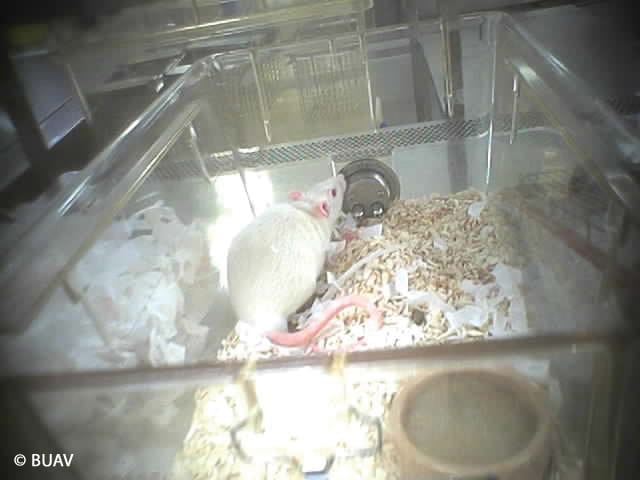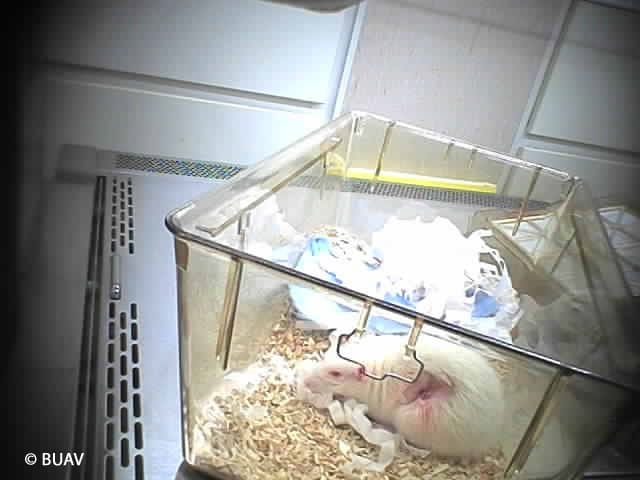Alleged animal abuse
Undercover investigation on standard of animal care at Imperial Researchers alleged to not understand terms and abuse animals Allegations to be investigated by Imperial Letter calling for independent inquiry delivered to Home Office

During the Easter break Imperial came under national scrutiny after a seven month undercover investigation by the British Union for the Abolition of Vivisection (BUAV) alleges that there is a poor standard of professional conduct by Imperial scientists. Researchers from Imperial, one of the signatories of the Declaration of Openness on Animal Research, were apparently filmed experimenting on animals in a way that the BUAV claim are inhumane; this includes operating on animals that the BUAV say were improperly anaesthetised and culling animals that were not needed by researchers. The BUAV sent an undercover veterinary nurse to Imperial, who over the course of her stay alleges that some researchers not only showed callous disregard for the animals under their care but she also claims that others acknowledged that they were untrained and some were clearly in breach of their licences.
The use of live animals in scientific experimentation is regulated by the 1986 Animals (Scientific Procedures) Act. The act (which has recently been revised to accommodate the European Directive 2010/63/EU on the Protection of Animals Used for Scientific Purposes) declares that an individual cannot use a regulated procedure on an animal unless they have a personal license, a project license and are carrying out their experiment in a licensed institution. The licences are provided by the Home Office, which enforces the act and sets the limits of each project according to its categorised severity. However, the BUAV are claiming that the video footage shows Imperial researchers who do not understand the limits of the licence and that others wilfully disregard their licence, causing further pain and suffering to their test subjects.
Imperial is not the first university that has been investigated by the BUAV, in 1998 a ten-month undercover investigation into the use of marmosets was filmed and released publicly in 2002. At the time the university in question (which was not Imperial) was not legally charged with any misdeeds however it was noted that at least one project licence had been exceeded and a later court found that the Home Secretary had miscategorised the severity of the experiment licence.
Regardless of the allegations of neglect and abuse of the animals under their care, the video footage does raise questions concerning how College approaches the training of new researchers experimenting on animals and how active College’s animal welfare officers are in spotting and reporting dangers to animal safety. This media coverage has also increased student awareness, many of whom may not have realised that animal testing occurs in College or what it entails. A glance at College social media pages also demonstrates the fury of some of the public who have fully supported the BUAV campaign against Imperial and sport anti-animal testing banners.

Imperial has released an official response to the allegations: “...Only a small percentage of medical and biological research involves the use of animals. That part remains vital, however, to further the development of treatments or cures for medical conditions that blight or destroy the lives of humans – and animals. Imperial College’s policy on the use of animals in research is that animals may only be used in research programmes where their use is shown to be essential. Scientists and staff at Imperial work hard to ensure that animals are kept and cared for using the highest standards of husbandry, thereby causing least pain or distress.” College has also commissioned an independent investigation into the allegations chaired by Professor Steve Brown, Director of the MRC Mammalian Genetics Unit, Harwell which describes itself as “An international centre for mouse genetics”. The BUAV have claimed that the MRC fund research at Imperial and that this could affect the independence of the review. Professor Brown is an advocate for the use of mice in medical research and sees mouse as a way of discovering the connection between genetics and disease in humans, with whom mice have 99% of DNA in common. Imperial has also alerted the Home Office to the BUAV allegations and has contacted all College staff with personal or project licences and reminded them of Imperial’s policies on animal welfare in laboratories.
While Imperial has responded to the allegations the BUAV is still petitioning for the removal of College’s establishment licence for the use of live animals in research. Frustrated with College’s decision to ask Professor Brown to head an investigation the BUAV and their supporters (including Imperial graduate Brian May) are also petitioning for a ‘wholly independent’ inquiry into the allegations and possibly the wider implications of the animal testing licensing system in place. The BUAV have delivered a letter to the Home Office, which was signed by MPs from all parties, calling for an enquiry that is independent of Imperial, the Home Office, and any institution funding or supporting research there.
How Imperial’s teaching and research will be affected by the upcoming investigation is yet to be understood however the allegations have certainly brought ideas concerning animal testing back into the mainstream community.
The following video is from the BUAV and may contain images that some readers may find unsettling.







